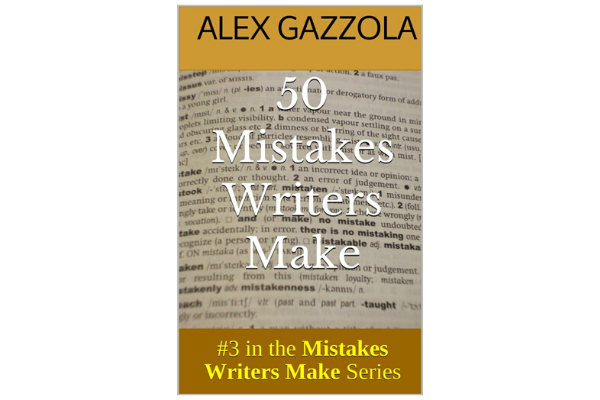Journalist as author: Alex Gazzola – 50 More Mistakes Writers Make

Freelance writer and editor Alex Gazzola specialises in health topics including allergies, skin sensitivities and gut health, and has authored books including Coeliac Disease: What You Need to Know and IBS: Dietary advice to calm your gut. He’s also a writing tutor and consultant, and runs a blog, Mistakes Writers Make, for novice non-fiction writers. Alex has written a series of books providing advice for this audience and has told us a bit more about his latest release, 50 Mistakes Writers Make.
Can you introduce your book in a couple of sentences?
It’s the third in a series of short books of advice to new writers who want to write articles, features, reviews and news. The first two were for absolute beginners, and this one is for those who’ve sold a few pieces, but want to progress further. All the advice is given through the prism of error – essentially a series of the most common mistakes I saw aspiring writers making in my many years as a writing tutor and advisor.
How did you come to write Mistakes Writers Make?
I was looking for a new way to help students. A lot of writing advice basically tells you what to do. This is fine, if it works for you. But if it doesn’t, then what? I found that some responded better to being shown where they might be going wrong, and being guided towards possible ways of putting it right. My philosophy has always been that we all make mistakes, that we shouldn’t be ashamed of them, that mistakes are good, and that you can learn from them – but that you may need them pointed out to you in the first instance. Some people responded to this approach, so I continued with it, first through a blog of the same name, and then the books.
Is there a top ‘Mistake Writers Make’ that bugs you more than others (and do you ever catch yourself making it)?
First let me say I make lots of errors myself, many of which no doubt irritate my editors and readers! But the point is that only the mistakes you make which are stopping you from progressing or doing what you want to be doing are the ones that really matter. The mistakes learners make never bug me, as we all have to go through the trial and error process. Errors of grammar are only a small part of the ‘Mistakes’ landscape, but if there’s one that I find irrationally maddening in established writers it has to be “There’s” followed by a plural.
Can you tell us about your next project (or book)?
No more Mistakes books for now, although I’m thinking about commissioning interested writers to add specialist titles to the series – such as 50 Mistakes Travel Writers Make, 50 Mistakes Food Writers Make, and so on. I’m writing a book on nickel / metal allergy, and working with a translator to publish a Spanish version of one of my other allergy books. I also run the Free From Skincare Awards, for allergy aware cosmetics, and will be launching that again in January.
Any tips for other journalists thinking of writing a book?
I’ve self-published five books, and five others through conventional publishers. Both have their merits. If you’ve got a very niche idea, I’d consider going it alone. If you think it has broad market appeal, I’d look at doing it through a publisher, and perhaps first try to find an agent. Attend the London Book Fair – it’s a great place to meet publishers and get a sense of what they are looking for.
What book(s) are you reading right now (or about to pick up)?
I’m a big re-reader, so have several books on the go which I’ve enjoyed and want to enjoy again – Stet by Diana Athill (about the author’s experiences as an editor in the post-war publishing scene) and Being Wrong by Kathryn Schulz (a forensic exploration of errors large and small) are both on my bedside table.
Where can we read your everyday journalism?
I used to contribute to a selection of popular health magazines but now write mainly for specialist allergy publishers such as FoodsMatter.com, a few allergy charities, and for my own websites, allergy-insight.com and mi-free.com.
Are you available for freelance commissions?
Always, though these days I usually only consider projects closely aligned to my specialisms. Emails welcome!
If I’m a PR professional/business with a story for you, can I get in touch?
Of course, but you need to have something original. I get many lazy approaches from food brands claiming to be allergy friendly and just looking for publicity. Tell me what you’re doing that nobody else is doing. Tell me what gap in the market you’re filling. Show a genuine understanding of the allergic or food-sensitive consumer. Email me if you have a USP. Yet another gluten-free brownie launch isn’t going to cut it!
50 Mistakes Writers Make is available for Kindle and in paperback from Amazon, as are books 1 and 2 in the series. See https://www.amazon.co.uk/Alex-Gazzola/e/B0034QHAJG. Connect with Alex on Twitter at @HealthJourno for allergy / gut health and @WritersMistakes for writing tips, competitions and opportunities, or see his websites http://www.alexgazzola.co.uk/ and http://mistakeswritersmake.com/